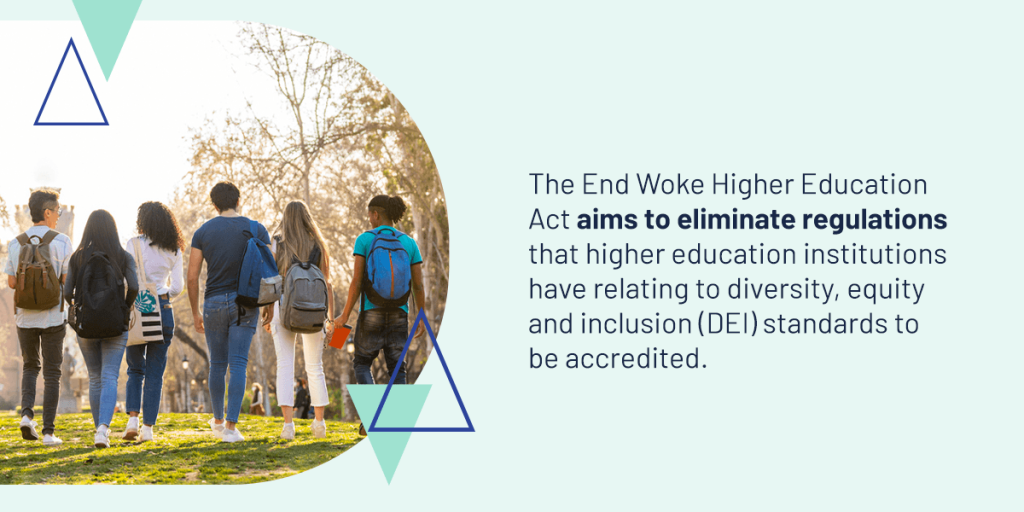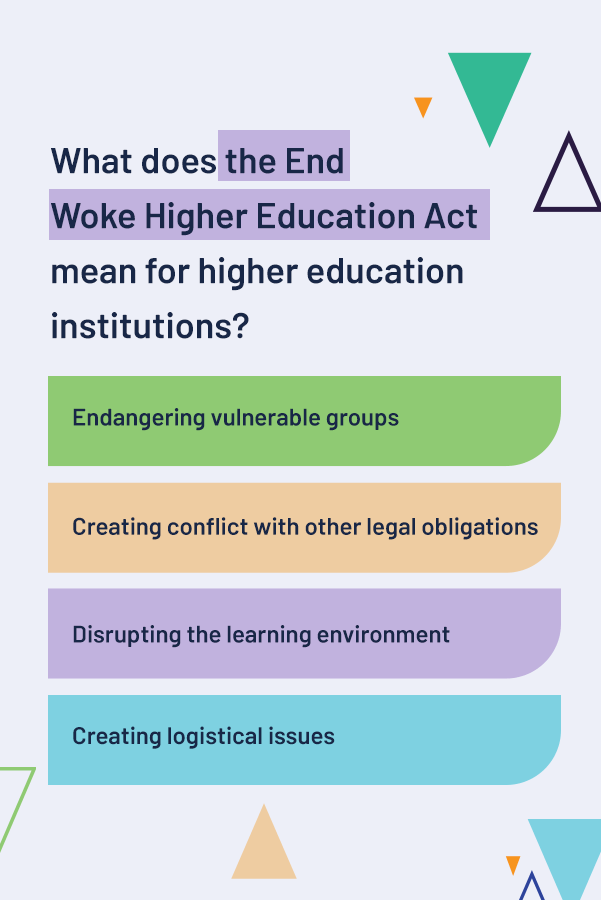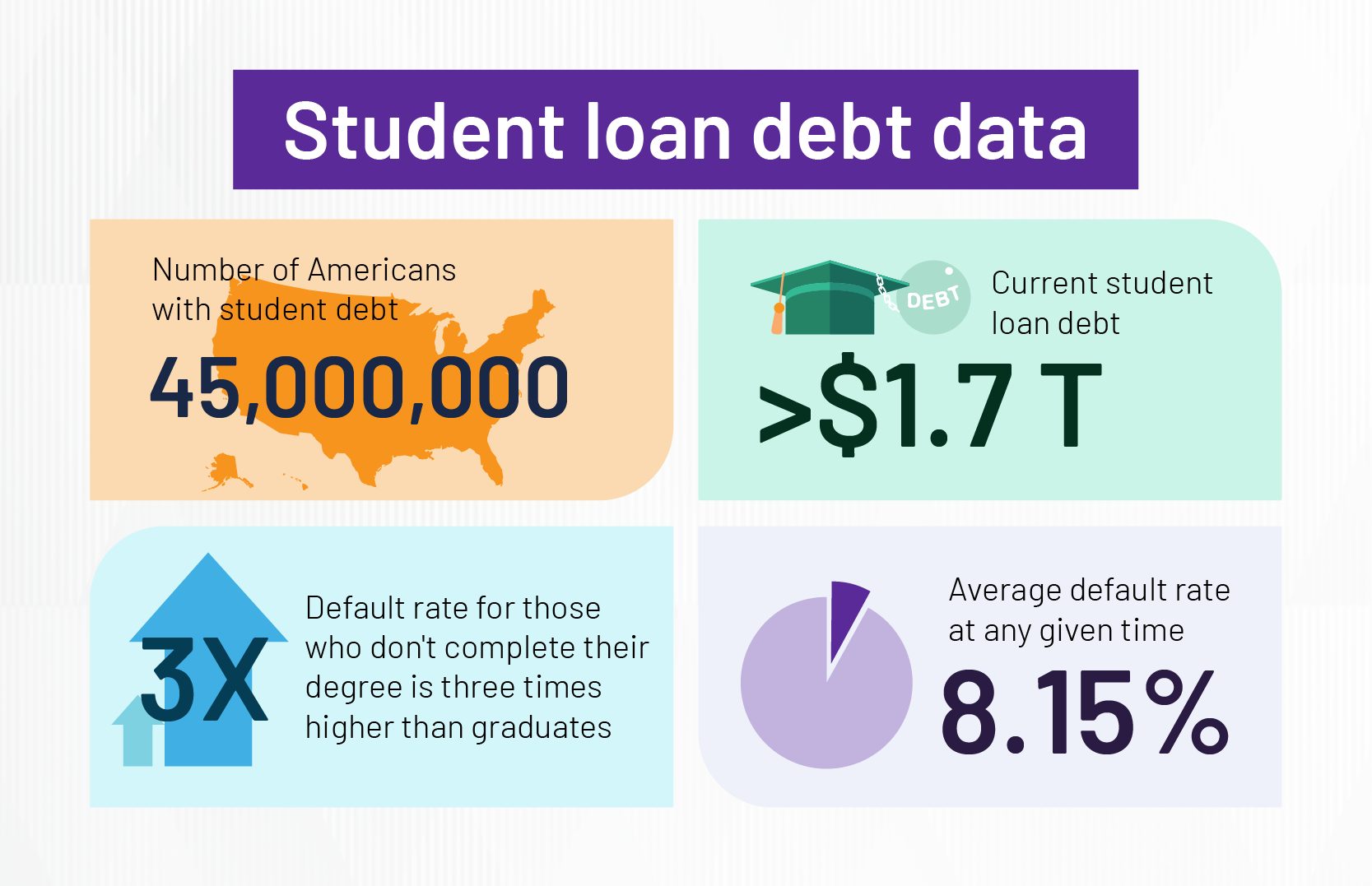
Amid the increasing polarization of American politics, the U.S. House of Representatives has passed H.R. 3724, or the “End Woke Higher Education Act.” Heading to the Senate, this bill aims to ensure higher education institutions don’t impose political litmus tests in promotion, admission, or hiring. The bill also aims to stop college accreditation agencies from compelling institutions to adopt political ideologies. In some cases, there have been threats to pull accreditation from high-profile institutions that lawmakers feel are inadequately protecting students.
While some argue that this legislation has the potential to enact positive change, many in higher education are concerned about its effects. The following guide will help decision-makers in higher education understand H.R. 3724, what it could mean for accreditation, and how to navigate the changing political landscape.
Understanding the End Woke Higher Education Act
The End Woke Higher Education Act aims to eliminate regulations that higher education institutions have relating to diversity, equity, and inclusion (DEI) standards to be accredited. It attempts to address what some consider an excessive focus on social justice and political activism in higher education institutions. Some believe it’ll defend students from mistreatment based on their political ideology, while others predict it could put students from minority groups at risk on campuses.
Virginia Foxx, the Act representative, claims it will safeguard student free speech from accreditation to the classroom. However, the Act has drawn criticism from many in higher education. Opponents claim it would establish rigid protocols that would hurt diversity in education. They also fear it will result in high costs to private colleges, undermining the bill’s primary purpose. The Act outlines that colleges must adopt new free speech policies to access Title IV funding — the backbone of many institutions.

The End Woke Higher Education Act would also:
- Require public colleges to provide students with a written statement during orientation that outlines their free speech rights.
- Limit the restrictions public colleges can place on protests in “generally accessible” areas on campus.
- Remove the ability of institutions to maintain “time, place, and manner” restrictions on demonstrations in these areas unless they meet specific criteria.
- Mandate that higher education institutions establish objective content and viewpoint-neutral standards for determining the funding student organizations receive.
The legislation prevents accreditation agencies from forcing higher education institutions to adopt or impose specific political ideologies. Perhaps most importantly, it would require institutions to inform students and faculty about their speech policies to participate in Title IV programs. Some argue that the system could become one where financial aid is blocked to students who need it, disrupting progress over the last decade to create more accessible education.
There are also threats to take away federal financial aid over civil rights violations on campus. Lawmakers warn institutions that their accreditation is in jeopardy, though experts note that the federal government has no say in accreditation.
Those opposed to the Act worry it could allow religious groups to discriminate against vulnerable and marginalized students. They also claim it will impact accreditation, which affects everyone. Students who graduate from institutions without accreditation may find it challenging to enter the job market. Many would have limited access to financial aid. This bill may also impact the campus environment, making minority groups feel unsafe. They argue it has broader implications beyond accreditation, that there could be long-term consequences for public perception of higher education.
Can the Department of Education pull accreditation?
Only accreditors can pull an institution’s accreditation, not the Department of Education. The department recognizes the accreditation process, which allows accredited institutions to access federal financial aid. Anyone who attacks an accreditor for one institution impacts the thousands they accredit. College presidents and members of the Department of Education agree — the president of the United States cannot pull an institution’s accreditation.
House Republican Steve Scalise warns Harvard that its government-certified accreditation could be pulled due to college protests in which it has yet to discipline students. This accreditation is required for higher education institutions to receive federal student loans, research grants, and other federal funds. Understandably, institutions are worried about their federal funding. However, the truth is drastically different.
Accreditation arose in the U.S. to ensure non-governmental peer evaluation of institutions and their programs. As such, the U.S. has no centralized authority that exercises national control. Federal control varies by state, but institutions can act autonomously. The status quo is unlikely to change.
What does the End Woke Higher Education Act mean for higher education institutions?

The End Woke Higher Education Act combines two bills — the Accreditation for College Excellence Act and the Respecting the First Amendment on Campus Act. The former attempts to make sure that institutions are not required to implement DEI practices to receive accreditation. It disallows accreditors to enforce standards that force institutions to take sides regarding political beliefs. The latter specifies that public colleges must completely sustain the First Amendment to receive Title IV funds.
Barbara R. Snyder, the president of the Association of American Universities (AAU) wrote to House leadership detailing the AAU’s numerous misgivings, which include:
- Endangering vulnerable groups: Legislation will restrict the ability to implement time, place, and manner restrictions, eliminating trusted methods to regulate regular speech. For example, time restrictions limit noise during class hours, and place restrictions designate safe and appropriate areas for large gatherings. She argues that it would harm institutions in their attempts to protect vulnerable students. Without the ability to manage demonstrations, vulnerable groups will be at risk.
- Creating conflict with other legal obligations: Snyder argues that the Act will jeopardize the existing legal landscape for higher education institutions. The Act would make it challenging for institutions to fulfill their Title IV responsibilities to protect students from discrimination while allowing free expression. Individuals could sue institutions over alleged attempts to curtail free speech, which could spark costly litigation when college closures are higher than ever.
- Disrupting the learning environment: Unregulated protest could interfere with classes, exams, and historical events, impeding the core mission of many institutions.
- Creating logistical issues: Snyder maintains that institutions would find it challenging to allocate resources effectively for security. Managing competing demands for campus space would be as challenging, potentially causing safety risks.
What about accreditation?
The Act aims to prevent accreditors from requiring institutions to set DEI policies. These policies could include standards to boost the graduation rates of underrepresented students, for example. Those in favor of the Act state that it doesn’t mandate any political viewpoint or ideology. They claim it alleviates pressure from accreditors to conform to a Marxist doctrine and critical race theory.
In short, the Act would render accreditors ineffective. Congress would step into power that goes beyond its traditional role in education. Should the Act pass, institutions could lose the accreditation that makes them viable, and their students would no longer have the same opportunities in the job market. Institutions would have to be more alert regarding meeting accreditation standards and changing their policies and behavior to avoid losing accreditation.
What can higher education institutions do going forward?
Although the Department of Education cannot pull college accreditation, institutions must stay abreast of the impending changes. Accreditors may change their criteria, which can have far-reaching implications for faculty, students, administrators, and institutions. Some of the steps institutions can take to weather accreditation uncertainty include:
Check free speech policies
Assuming the Act goes forward, institutions will have to disclose their speech policies to the Department of Education, faculty, and students. Many institutions already have policies regarding free speech, and they would benefit from reviewing these policies to ensure they align with current best practices.
Understand changing expectations
Maintaining accreditation means being familiar with the accrediting agency’s standards and expectations. When these may change, institutions must ensure they understand the standards regarding the type, level, and scope of their programs. Timelines, procedures, and requirements for the accreditation cycle may change, and programs may need to submit additional information or host new site visits to gather feedback on accreditation changes.
These procedures and timelines may seem straightforward but present significant challenges. Having a team focused on meeting them can change the game for institutions, providing up to date information on how to meet the necessary standards.
Establish objective, content-neutral, and viewpoint-neutral standards
Establishing objective, content-neutral, and viewpoint-neutral standards involves a delicate balance between upholding academic rigor and ensuring inclusivity and representation of diverse perspectives. It includes two basic principles:
- Content neutrality: Institutions looking to comply with these standards must focus on factual accuracy and prioritize verifiable information while avoiding personal opinions or biases. They must also present multiple perspectives and interpretations to encourage students to think critically and analyze. Faculty must use objective language, avoiding phrases that imply favoritism.
- Viewpoint neutrality: Viewpoint neutrality involves respecting academic freedom and freedom of expression. It allows students and faculty to express their views openly and respectfully. Institutions must promote open dialogue and debate, even on controversial topics. They must also avoid censorship or oppression of viewpoints.
Despite their benefits, objective, content-neutral, and viewpoint-neutral standards can be challenging for institutions to implement. Institutions can benefit from training faculty and students on objectivity and viewpoint neutrality. They can encourage students to ask questions and challenge assumptions, creating a culture of respectful inquiry and intellectual exploration.

Focus on ongoing self-assessment
As accreditation expectations have the potential to change, engaging in ongoing self-assessment of an institution’s strengths, weaknesses, and challenges can boost agility. Collecting and analyzing data gives institutions evidence of their performance and progress toward objectives. Embrace challenges as opportunities for growth.
With so much talk of accreditation challenges, it’s natural for stakeholders and faculty to feel uncertain. Involve your stakeholders and faculty in accreditation. Faculty can add immense value in several areas, including curriculum development and self-study participation. Institutions can discuss accreditation regularly and promote accountability in faculty to ensure they stay ready for any accreditation changes.
Integrate strategic plans and actions
Once a self-assessment has revealed a program’s growth areas, institutions can implement strategic plans and actions to address gaps or changes. Depending on the situation, institutions may want to revise their missions, visions, and values, especially if they want accreditation from the Department of Education.
The strategic plan to reflect potential accreditation must reflect these missions, values and visions, in addition to evaluating external factors regarding accreditation. An excellent step is to create a detailed action plan to outline the steps necessary to reach the desired outcome.
Demonstrate compliance
Maintaining compliance is only helpful if institutions can demonstrate it to the accreditor and other external stakeholders. They must prepare and submit comprehensive, detailed reports documenting their performance and achievements. These reports must also tell an institution’s story, outlining its challenges and how it overcame them.
The data accreditor’s request must be submitted in the stipulated time, which leaves many institutions scrambling at the last minute. Instead, regular reviews using real-time data ensure that organizations stay ready when accreditors require information.
Collaborate and ask for feedback
One of the best ways to maintain accreditation is to collaborate with the accrediting body and ask for feedback. Attending workshops, conferences, and networking opportunities organized by the accrediting agency allows institutions to learn from current trends, best practices, and innovation in higher education. Institutions also benefit from feedback from peers, consultants, and experts.
Leverage data-driven insights
Real-time assessment data is a powerful tool in a changing accreditation landscape. It gives institutions insights into their strengths and growth areas, allowing them to transform their action plans to reflect assessment changes. Ineffective use of data can complicate accreditation preparation, but using it to guide reform can help institutions align with accreditor guidelines and optimize their performance.
Gathering data in one centralized location and turning it into actionable insights can help institutions monitor progress and overall effectiveness. As they look at their insights, they can fine-tune their processes and ensure compliance with accreditation standards. With data analytics tools, institutions can simplify complex data and communicate their eagerness to share their progress in meeting accreditation goals.
Manage accreditation with Watermark
Although the Department of Education cannot remove accreditation from higher education institutions, complying with the End Woke Higher Education Act may still be a long-term challenge. Institutions must find creative ways to maintain equity for students and themselves. Gathering and using institutional data to maintain accreditation in an evolving space will be more critical than ever.
With accreditation management software from Watermark, you can easily demonstrate your progress. Watermark’s solutions simplify, streamline, and enhance accreditation review and reporting. You can build robust processes using real-time data, so you’re always ready to demonstrate compliance. Our Educational Impact Suite (IES) allows you to gather and synthesize assessment and programmatic data into actionable reports. Book a demo today and be prepared for accreditation!
















































































































































































































































































































































































































